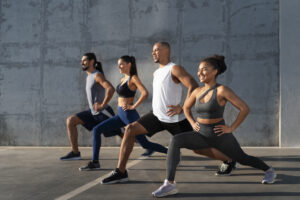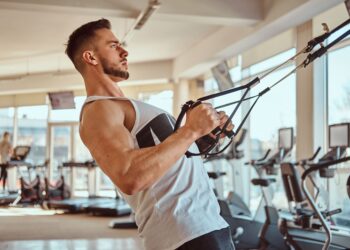One of the best things we can do for our hearts, minds, and bodies is to exercise. Daily physical activity contributes to a longer, healthier, and more contented life, much like eating a balanced diet.
Nowadays, a lot of people sit too much at work, school, and home, which can be harmful to our health. However, even 20 to 30 minutes of daily exercise can have a significant impact.
This post will discuss the benefits of exercise for both your body and mind, why it’s important, and how to start moving more each day.
What makes exercise crucial?
1. Exercise Strengthens Your Body
Our bodies were designed to move. We develop strong bones and muscles when we run, walk, stretch, and lift weights. This improves our ability to move, carry objects, and stay injury-free.
You can maintain a healthy weight or lose weight by exercising. It prevents fat from accumulating and burns calories.
Good exercise examples include:
- Walking
- Running
- Cycling
- Swimming
- Dancing
- Weight training
- Playing sports
Little things like walking after dinner or using the stairs can make a big difference!
2. Exercise Benefits Your Brain
Exercise is beneficial to the brain in addition to the body. Your brain receives more oxygen and blood when you move. You learn more quickly, think more clearly, and feel more focused as a result.
Additionally, exercise lowers depression, anxiety, and stress. Your brain releases feel-good and calming chemicals like serotonin and dopamine when you move your body.
Thus:
Feeling blue? Take a stroll.
Are you feeling worn out? Perform a few jumping jacks.
Are you upset? See how working out affects your mood.
3. Exercise Protects Your Health
Regular exercise can extend your life. It lowers the risk of numerous diseases and safeguards your heart, including:
- Heart disease
- High blood pressure
- Type 2 diabetes
- Obesity
- Stroke
- Some types of cancer
Additionally, exercise strengthens your immune system, increases blood circulation, and benefits your lungs.
To put it briefly:
Move more, get sick less!
4. Exercise Promotes Better Sleep
Exercisers frequently have better nighttime sleep. They go to sleep more quickly and wake up feeling more rested.
For your body to recover, your brain to rest, and your mood to remain stable, you need to get enough sleep.
Just keep in mind that vigorous exercise right before bed may cause you to feel too energized to fall asleep!
5. Exercise Improves Confidence
Your body feels better when you move more. You might see an increase in muscle mass, strength, and weight loss. Additionally, your clothing may fit better.
Many people feel more confident as a result. You smile more, feel proud, and walk taller.
Exercise also teaches discipline; you get stronger on the inside and out when you persevere through difficult times.
Types of Exercise
Exercise can be divided into four categories. Make an effort to complete them all this week:
| Type | What it does | Examples |
|---|---|---|
| Cardio (aerobic) | Improves heart & lungs | Walking, running, biking, dancing |
| Strength training | Builds muscles & bones | Lifting weights, push-ups, squats |
| Flexibility | Makes your body move better | Stretching, yoga |
| Balance | Prevents falls & helps posture | Tai chi, standing on one leg |
How Much Exercise Do You Need?
The World Health Organization says:
- Adults: Engage in moderate exercise for at least 150 minutes each week, or roughly 30 minutes each day, five days a week.
- Or 75 minutes of hard (intense) exercise weekly.
- Also: Strength training with weights or bodyweight exercises should be done twice a week.
You don’t need a gym. You don’t need machines. All you need is to move.
Like:
- Walk 15 minutes in the morning and 15 in the evening.
- Do push-ups or squats at home.
- Dance to music in your room!
Tips to Start Exercising
It’s better to start small than never start at all. Here are a few simple pointers:
- Set a goal: Start with 10 minutes a day. Add more over time.
- Make it fun: Play a sport, dance, or walk with a friend.
- Be regular: Exercise at the same time every day.
- Track progress: Use a notebook or app to see your improvements.
- Don’t give up: Some days are hard. Keep going anyway.
Do You Workout Often?
Exercise isn’t just for athletes. Everyone can use it, regardless of age, weight, busyness, or free time. There’s always more to move.
You don’t have to be flawless. All you have to do is begin.
Stroll, stretch, dance, run, jump, and move.
Your future self will appreciate it. Your heart, brain, and body will all feel better.
Take the first step now.
It need not be large.
Just move — and let your life start changing.
Now, what about exercising your english with some questions?
To improve your reading abilities, start the test.
We are happy to help you improve your English skills. Keep practicing by reading more articles and doing the exercises. You can also practice by viewing the video bellow. While watching, read the subtitles, and if possible, read them out loud:
Vídeo do canal British Heart Foundation — assista mais no canal oficial
Vocabulary
| Word | Meaning | Example |
|---|---|---|
| Circulation | Movement of blood through the body | Exercise improves blood circulation. |
| Immune system | The body’s defense against sickness | Exercise makes your immune system stronger. |
| Posture | The way you hold your body when sitting/standing | Balance exercises help your posture. |
| Discipline | The ability to stay focused and keep working | Exercise teaches discipline over time. |
| Intense | Very strong or extreme | Avoid intense exercise before sleep. |
| Cardiovascular | Related to the heart and blood vessels | Cardio workouts improve cardiovascular health. |
| Aerobic | Exercise that improves oxygen use in the body | Running is a good aerobic exercise. |
| Strength training | Exercises to build muscle strength | Push-ups are a type of strength training. |
| Flexibility | Ability to move joints easily | Stretching increases flexibility. |
| Balance | Ability to stay steady without falling | Yoga helps improve your balance. |
After learning the value of exercise, how about continuing your practice with our next topic: daily routine? To view it, click the post directly below.















